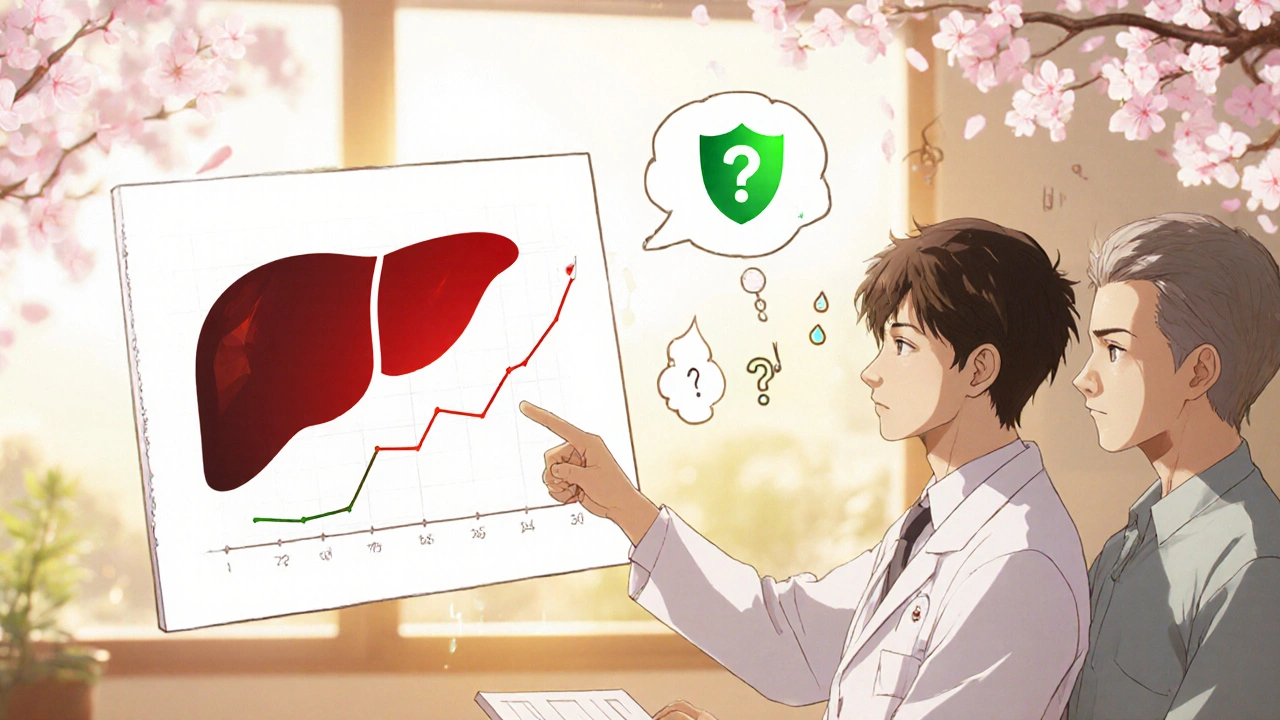Mild Elevation of Liver Enzymes from Medications: What It Really Means
 Nov, 26 2025
Nov, 26 2025
Liver Enzyme Risk Checker
Check if your liver enzyme elevation is mild and safe based on your blood test results and symptoms. Based on medical guidelines from the American College of Gastroenterology and FDA.
Enter your data to see results
Your risk level will appear here based on medical guidelines
Recommended actions will appear here after checking your risk level
When your blood test shows slightly higher liver enzymes, it’s easy to panic. You’ve been taking your medication as prescribed-maybe statins for cholesterol, or acetaminophen for pain-and now your doctor says your ALT or AST is up. Is your liver damaged? Should you stop the drug? The truth is, mild elevation of liver enzymes from medications is far more common-and far less dangerous-than most people think.
What counts as a "mild" elevation?
Liver enzymes like ALT (alanine aminotransferase) and AST (aspartate aminotransferase) are proteins found in liver cells. When these cells get irritated or damaged, they leak enzymes into the bloodstream. That’s what shows up on a blood test. But not all elevations are the same. A mild increase means your levels are between 1 and 3 times the upper limit of normal. For most labs, that’s roughly 40-120 U/L for ALT (normal is usually 7-55 U/L). Moderate elevations are 3-5 times normal. Anything above 5 times normal is serious and needs urgent attention. Here’s the key: if your numbers are in the mild range and you feel fine-no jaundice, no belly pain, no nausea-you’re likely looking at a harmless lab quirk, not liver damage.Which medications cause this?
Lots of common drugs can nudge liver enzymes up a little. Statins like atorvastatin and simvastatin are the most well-known. About 0.5% to 2% of people on statins see mild elevations. That’s not a lot, but because so many people take them, it adds up. Acetaminophen (Tylenol) is another big one. Even at the standard dose of 4,000 mg a day, up to 58% of healthy people will show a mild rise in ALT after a few days. That doesn’t mean they’re harming their liver-it’s just how the body responds. Other common culprits include:- Amiodarone (for heart rhythm)
- Methotrexate (for rheumatoid arthritis or psoriasis)
- Isoniazid (for tuberculosis)
- Some antibiotics and anti-seizure meds
Why do doctors still worry about this?
Historically, doctors were taught to treat any rise in liver enzymes as a red flag. Back in the 1990s, routine monitoring was standard for statins and other drugs. But that changed. In 2012, the U.S. Food and Drug Administration (FDA) officially stopped recommending routine liver tests for people on statins. Why? Because they reviewed data from over 86,000 patients across 31 clinical trials-and found no link between mild enzyme elevations and actual liver injury. The American College of Gastroenterology, the American Association for the Study of Liver Diseases, and the European Association for the Study of the Liver all agree now: mild elevations from medications are almost never dangerous. You don’t need to stop the drug. You don’t need to panic. Yet, many doctors still overreact. A 2020 survey showed primary care providers followed the guidelines correctly only 62% of the time. Hepatologists? 89%. That gap means a lot of people are being told to quit life-saving meds over a lab number that doesn’t mean what they think it does.What happens if you keep taking the medicine?
The best evidence says: keep going. A 2021 study in the Journal of Hepatology followed patients with statin-induced mild enzyme elevations who kept taking their pills. In 73% of cases, the enzymes went back to normal on their own-without stopping the medication. The patients didn’t develop liver disease. Their heart protection stayed intact. One patient in Sydney, on atorvastatin for 10 years, had ALT levels hovering between 65 and 85 U/L for five straight years. Ultrasounds showed no fatty liver, no scarring. His cholesterol stayed under control. He never had a heart attack. Stopping the drug, on the other hand, can be risky. Statins prevent heart attacks and strokes. If you quit because of a mild enzyme rise, you’re trading a tiny, harmless lab change for a real, measurable risk to your heart.
When should you actually worry?
Not every rise in enzymes is harmless. You need to take action if:- Your levels are above 5 times the upper limit of normal
- You have symptoms: yellow skin, dark urine, belly pain, vomiting, extreme fatigue
- Your bilirubin or INR (a clotting test) is also high
- The rise keeps climbing after you’ve stopped the drug
What should you do next?
Here’s a simple, step-by-step plan:- Don’t stop your medication. Not without talking to your doctor.
- Ask for a repeat blood test in 2-4 weeks. Many mild elevations fix themselves.
- If the level drops or stays stable, keep taking your drug. No further action needed.
- If it goes up again or hits 3-5 times normal, your doctor may lower your dose or switch you to another drug.
- If it goes above 5 times normal, or you have symptoms, see a liver specialist.
Why do patients panic so much?
A lot of this fear comes from misinformation. On patient forums like Reddit and the American Liver Foundation’s site, 78% of people posting about mild enzyme elevations say they’re terrified of liver failure-even when their doctor says they’re fine. And it’s understandable. The word "liver" sounds scary. But the truth is, your liver is one of the toughest organs in your body. It regenerates. It adapts. A little bump on a blood test doesn’t mean it’s breaking down. One patient on HealthUnlocked shared that after reading up on the science, she stopped worrying. "My doctor said my liver was fine. So I kept my statin. My heart is protected. My liver is fine. I sleep better now."


ka modesto
November 26, 2025 AT 19:22Just wanted to say this is one of the clearest explanations I’ve read on this topic. I’ve been on atorvastatin for 5 years and my ALT hovered around 70-my PCP wanted to pull me off it until I showed him this. Now I’m just glad I didn’t listen to the panic.
dayana rincon
November 27, 2025 AT 18:26My liver enzymes were up and I was ready to quit everything… then I Googled and realized I was basically freaking out over a number that meant nothing. 🤦♀️
Luke Webster
November 29, 2025 AT 00:28I’m a nurse in a rural clinic and I see this all the time. Patients get scared out of their minds over a 2x elevation. We’ve stopped doing reflexive statin holds unless there’s actual symptoms. The liver is way tougher than people think. It’s like scaring someone because their car’s check engine light came on-sometimes it’s just a loose gas cap.
Also, the fact that 58% of people on Tylenol show mild elevations? That’s wild. It’s not damage, it’s just a biological shrug.
And honestly? If you’re taking statins and your liver enzymes are mildly up but you’re not jaundiced or vomiting, you’re fine. Your heart’s still getting protected. That’s the real win.
Sondra Johnson
November 29, 2025 AT 06:54Ugh, I’ve been through this circus. My doctor treated my ALT of 82 like I was one ibuprofen away from liver failure. I had to bring him the FDA guidelines, the AASLD statements, and a 2021 J Hepatology paper just to keep my statin. The system is still stuck in 1998 while the science moved on in 2015. It’s exhausting.
But here’s the kicker: my cholesterol’s never been better, I’ve got zero heart issues, and my liver ultrasound looked like a postcard of a healthy organ. Meanwhile, my cousin quit her statin over a lab number and had a stroke last year. The real danger isn’t the enzyme-it’s the fear.
Cindy Burgess
November 29, 2025 AT 08:28It is, without a doubt, a matter of considerable concern that the medical community continues to perpetuate outdated paradigms regarding hepatic enzyme elevation. The data is unequivocal, yet dissemination remains woefully inadequate. One must question the epistemological foundations of primary care protocols when they diverge so starkly from evidence-based guidelines. The consequences are not trivial.
Tressie Mitchell
November 29, 2025 AT 15:18Wow. Just wow. So now we’re supposed to trust a bunch of guidelines over our own instincts? My mom had liver failure from a statin. You think she cared about ‘mild’ elevations? Your ‘science’ doesn’t erase real trauma.
And don’t get me started on how Big Pharma pushed this narrative. You’re just another shill for the drug companies.
Chelsey Gonzales
December 1, 2025 AT 00:09i was so scared when my alt was 90 but then i read this and i was like… wait… my liver is chill? like… it’s just vibin’? lol. i kept my statin and my heart feels great. my liver too. 🤙
Crystal Markowski
December 2, 2025 AT 18:22Thank you for this thoughtful, well-referenced breakdown. As a primary care provider, I’ve struggled with the tension between patient anxiety and clinical evidence. This post gives me a solid script to use with patients who are terrified of their lab results. I’ve already shared it with my team. We’re revising our protocols next quarter.
One small addition: if patients are on multiple medications that affect the liver, I recommend checking for drug interactions. Sometimes it’s not the statin-it’s the combo. But even then, mild elevations rarely require discontinuation.
Orion Rentals
December 3, 2025 AT 13:33Ms. Mitchell’s comment raises a valid emotional concern, but it is imperative to distinguish anecdotal experience from population-level evidence. While individual cases of adverse events are tragic, they do not invalidate large-scale, randomized, controlled trials involving over 86,000 subjects. The FDA’s 2012 guidance was not issued lightly. It was the result of rigorous meta-analysis.
Furthermore, the notion that pharmaceutical companies are orchestrating a narrative to downplay liver toxicity is a misreading of the data. The same institutions that flagged statin-related myopathy in the 1990s are the ones now advising against routine monitoring. The science is self-correcting.
MaKayla Ryan
December 5, 2025 AT 08:27USA doctors are finally catching up? Took long enough. In Europe, they’ve known this since 2010. Why are we still playing catch-up? I swear, American medicine is stuck in the Stone Age. I had to fly to Germany to get a second opinion because my doc wanted to pull my statin. Pathetic.
Kelly Yanke Deltener
December 6, 2025 AT 04:40I just want to say… I’ve been on statins for 8 years. My enzymes were up. I cried. I felt guilty. I thought I was killing myself. Then I found out it was normal. I didn’t stop. I’m still here. My heart is fine. My liver is fine. I’m not scared anymore. But I wish someone had told me this sooner. I wish I hadn’t felt so alone.